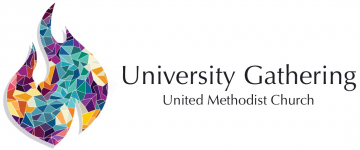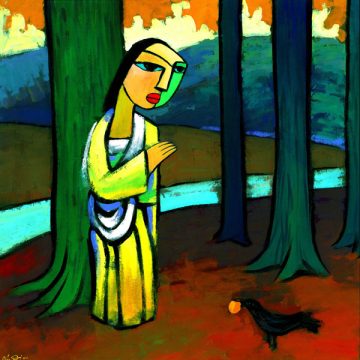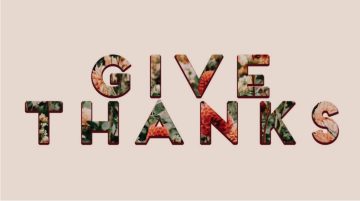Posts by Paul Ortiz
Prophetic Double Vision
Kindred in Christ,
One of my favorite theologians and artists is He Qi. From Mainland China, he is a professor at the Nanjing Union Theological Seminary. His art is known to be a mix of Chinese folk art with modern art styles depicting Biblical stories in a new light. Above, his piece, Elijah and the Ravens, is a portrait of Elijah being sustained with food from God through the ravens he encountered in the wilderness (1 Kings 17).
When asked why Elijah had a face of two tones, and two eyes looking in seemingly different directions, Qi responded, “The Hebrew prophets often had “double vision.” One eye to see and call out the injustice of the present, and another eye toward the future God was calling the people toward.”
As we continue in our series, Running into the Future, we will explore what it means to rely on God to continue to sustain us, as well as give us “double vision” for the journey ahead. This Sunday, we will also welcome two new members to our congregation, Clara Too and Clara Mariño, which makes 11 new members this year! May we continue to gather and share vision with new people as we move forward together.
Alongside you,
Rev. Paul Ortiz
Give Thanks
Kindred in Christ,
This Sunday we continue our series, Running into the Future! This coincides with our pledge campaign season. If the ministry of U Gathering has made a difference in your life and you feel called to partner with us, we invite you to prayerfully consider what financial pledges you are being called to commit to for the coming year. Your pledges enable us to create a sustainable budget for 2024, as well as continue to run together into God’s future of greater inclusion, creativity, and justice in the U District of Seattle.
During this series we are considering the ingredients needed to continue to honor our past while moving forward into the future. Last week we talked about cultivating a nimble faith, which is being flexible and open to God’s unexpected leading in our lives. This week we are talking about having an attitude of gratitude. The giving of our time, talents, and finances to the church and our communities should overflow as a response to the grace of God experienced in our real lives.
Yet the pain and oppression we witness in the world can seem to eclipse the goodness of God that is still all around us. While on the other hand, the privilege that many of us benefit from, due to our social locations, deceives us to think we never have enough and always deserve more of any given thing.
In the midst of all this, the practice of gratitude invites us to stop, search for God’s gifts, and respond to that goodness. Gratitude reminds us of that while injustice and suffering are real, they are not all of reality. And our gratitude moves us toward a type of resistance, which overflows into thanksgiving, works of mercy, and justice. Moreover, gratitude enables us to remain humble and manage our own privilege and entitlement.
Throughout the New Testament, the Apostle Paul usually did not thank people directly in his letters. He rather would give thanks to God for people in his life. “I thank God every time I remember you. In all my prayers for all of you, I always pray with joy because of your partnership in the gospel from the first day until now” (Philippians 1:3-5).
As I continue in my pastoral and community-building work, I move from a deep gratitude for each of you who are connected through the ministry of U Gathering. I give thanks to God for the unique ways you bring your authentic selves and partner with us in this gospel work.
Lastly, I want to lift up a quote from one of our members, Julianne, which expresses her gratitude for the kind of community we are and which we are called to continue to become:
I love that I can be at U Gathering on any given Sunday, no matter where I am emotionally or spiritually, and know I’ll enjoy seeing old friends and celebrating new connections; know that I’ll hear a message of inclusivity, welcome and invitation; know that my teens (even if not attending that day) are seen and valued by the relevant and gender-affirming language and message; and finally, know (or re-learn) that I am part of the “everyone” continuously invited to God’s loving table. – Julianne Hake
Alongside you,
Rev. Paul Ortiz
Running into the Future
Kindred in Christ,
In the letter to the ancient church of Philippi, the Apostle Paul writes, “Not that I have already obtained this or have already reached the goal, but I press on to lay hold of that for which Christ has laid hold of me” (Philippians 3:12). If in some way Christ has touched or laid hold of your life through the ministry of University Gathering UMC, then we invite you to join us in pressing on and running the race into our future. Your financial pledges help us not only create a responsible operating budget for the year to come, but empower us to continue unfolding God’s love, inclusion, and justice in new ways in the U District of Seattle.
This past year we welcomed nine new official members to our congregation! And we have shared power with multiple new leaders who are helping us grow toward the goals that God is laying out before us. Over the past three years of serving as your Lead Pastor, I have witnessed us form teams of both longtime members and new members to help us update our church name to reflect the gathering of people we are called to be, hire a new worship leader to lead us in choir, hymns and new songs, and now we are searching for a new interim location to, among other things, help us have a facility where we can meet during the week and have greater presence and impact in our neighborhood. We resurrected children’s ministry a little over two years ago and we now have an average of 4-7 children attending on Sundays, and new families connecting in our community outreach events and weekly worship.
In fact, due to this growth, we have discerned that it is the right time to invest further in our children and families ministry as well as outreach. Under the guidance of our Staff Parish Relations Committee and Church Council, we have approved the creation of an updated, full-time staff position for a Children and Families Minister who will work closely with our leadership and myself (Pastor Paul) to both minister to our present children during our weekly gatherings, as well as help host outreach events and connect with new families in our neighborhood. We have already gained traction in both of these fields, and realize that it is time to hire someone full-time to help take us to the next level of intergenerational church growth. I am thrilled that we have discerned to take this next faithful step together!
This past year we also came together for several all-community conversations and church votes as we discerned how to move forward with our building campaign and decisions around the kind of building project we want to create in the future. As I recall the journey and all the goals we have accomplished along the way, I also realize that the journey is just beginning! I hope you will prayerfully consider pledging financial resources for the coming year, so that we can run into the future that God has for us together. And I hope you will join us through the month of November for our Running into the Future worship series!
Alongside you,
Rev. Paul Ortiz
All Saints and Día de los Muertos
Kindred in Christ,
This Sunday we will observe All Saints Day. This is a special time we are invited to remember the “great cloud of witnesses” (Hebrews 12:1) that have gone before us, yet in some mysterious way still bless and encourage us to press forward. This is also a season to remember that God’s love is greater than death itself, which invites us (the living) to work against systemic forces that wield oppression and death in the world.
With All Saints and Día de los Muertos coming up, some say the veil between the living and the dead is a little thinner during this time of year. As you move though this season, I invite you to consider, “Who lingers close to your memory? Who walked with you in such a way that challenges you for greater love and justice? Who inspired and shaped the path you travel today?” And remembering that in these days, the veil thins not only towards the past but also towards the future; how are you moving through this life in a way that will help make possible the paths of those who follow?
Alongside you,
Rev. Paul Ortiz
Intentional Direction
Kindred in Christ,
This Sunday we will do worship a little differently. In lieu of a of a full sermon, we will take time to reflect on the church we are becoming and discuss with one another what it means to be on a journey of faith into the unknown. This will lead into a presentation and update from our New Building Search Team (see team members and more info below), and an opportunity for us to vote on the building needs that will guide the search for our new temporary home in the U District. A timeline will also be shared.
It is appropriate that this will conclude our series, Roots: (Re)discovering the Methodist Revival Movement. As we will also explore this Sunday, the early Methodist revival was less concerned about preserving a particular shape and more about continuing an intentional direction. Join the conversation on the direction we are headed as we seek to remain open to the future shapes we will take.
In the meantime, I offer you a prayer by one of my heroes in the faith, Thomas Merton (pictured above). It is an appropriate prayer for a life of faith as individuals and as a collective community:
My Lord God,
I have no idea where I am going.
I do not see the road ahead of me.
I cannot know for certain where it will end.
nor do I really know myself,
and the fact that I think I am following your will
does not mean that I am actually doing so.
But I believe that the desire to please you
does in fact please you.
And I hope I have that desire in all that I am doing.
I hope that I will never do anything apart from that desire.
And I know that if I do this you will lead me by the right road,
though I may know nothing about it.
Therefore will I trust you always though
I may seem to be lost and in the shadow of death.
I will not fear, for you are ever with me,
and you will never leave me to face my perils alone.
Amen.
Alongside you,
Rev. Paul Ortiz





